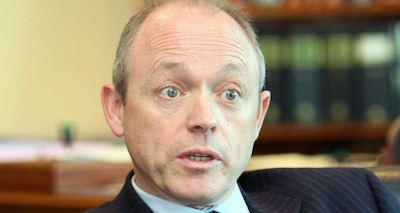
The head of the Crown Prosecution Service in the north of Ireland, Barra McGrory, is facing an apparent loyalist death threat over allegations that he is working to a Sinn Fein agenda.
One loyalist website linked to the UDA in North Antrim and Derry referred to Mr McGrory as “enemy number one as far as loyalists are concerned”.
Unionists have denounced the chief prosecutor in the North since his appointment because Sinn Fein’s Gerry Adams was one of his clients when he worked in private legal practice.
But Mr McGrory has faced escalating controversies in the past few weeks over decisions to abandon prosecutions against senior Sinn Fein and Provisional IRA figures.
At a hearing on Thursday’s hearing at Stormont, former DUP health minister Edwin Poots accused him of providing the worst prosecution service in decades: “In some instances, people are scratching their head and asking the question: ‘What has to be done to get a successful prosecution against certain members of our community?”
Late last month, an independent review found that three women who claimed they were sexually abused by former IRA Volunteer Martin Morris when they were in their teens in the late 1990s were “let down by the Public Prosecution Service and counsel” after the case collapsed. The three included Mairia Cahill, a niece of IRA figure Joe Cahill, who has accused Mr Adams and others in Sinn Fein and the Provisional IRA of covering up the abuse.
Mr McGrory was also required to address a report by the Six County attorney general, John Larkin, in relation to the decision not to prosecute Gerry Adams for withholding evidence about his rapist brother. In 2013 Liam Adams, the brother of the Louth TD, was jailed for 16 years for raping and abusing his daughter after being found guilty of a series of assaults on his child Áine Dahlstrom (nee Tyrell) between 1977 and 1983.
Larkin said prosecutors were right in not taking an “unfair” action against Mr Adams. He said the test for prosecution had been correctly applied to the available evidence.
While Mr McGrory said he accepted the criticisms on the Cahill case, he told the committee there was “nothing damaging” in Larkin’s report on the Adams case.
“To say that there isn’t a public confidence in the Public Prosecution Service is a sweeping and inaccurate statement,” he said.
However, Justice Committee chairman Alastair Ross said the attorney general’s report was “another deeply damaging” one for the Public Prosecution Service.
“The conclusions from the Attorney General also highlight further serious questions for both Gerry Adams and the Director of Public Prosecutions,” he said.
The collapse earlier this month of the trial of republicans Padraic Wilson and Sean Hughes on charges of membership of the Provisional IRA was another source of controversy for McGrory. Their trial collapsed when prosecutors said they would not be offering any evidence against them. No reasons were given for the decision, but it is understood that, as in the Máiría Cahill cases, key witnesses withdrew their evidence.
BOSTON TAPES
Even bigger controversies may lie ahead for McGrory’s team following reports that prosecutors will soon decide if Mr Adams is to be charged in connection with the killing of alleged IRA informer Jean McConville in 1972.
In April of last year, the Sinn Fein leader was arrested and interrogated for four days, before being released pending a decision on prosecution. At the time, McGrory excluded himself from the case on the basis of a potential conflict of interest.
A spokesperson for the Crown prosecution service said this week that a decision on whether to being Mr Adams to trial will be revealed “in a number of weeks”.
Interviews recorded with IRA figures in Boston as part of an academic project are alleged to support the case against Mr Adams, who has always vehemently denied the claims.
His arrest brought a wave of international attention to the stalemate that has gripped the North’s peace process, with Sinn Fein accusing an anti-peace process “rump” within the PSNI of orchestrating the arrest. They have branded the PSNI’s treatment of Mr Adams as “political policing”, specifically timed to damage the party’s electoral chances.
Although BBC reports have suggested there is insufficient evidence to pursue a prosecution against Mr Adams, it was announced last week that a former comrade of his, Ivor Bell, is to face trial in connection with the case and on the basis of the same evidence.
The oral history project by Boston College has been the subject of extensive litigation on both sides of the Atlantic as the PSNI have doggedly pursued the project’s transcripts and tapes, particularly those relating to IRA activity.
This week it was decided by judges in Belfast that the PSNI should have greater access to the interviews, including those allegedly given by a former loyalist prisoner, Winston ‘Winkie’ Rea’. Last month, the European Court of Human Rights in Strasbourg refused to grant an interim prohibition as part of last-ditch efforts to stop the PSNI from listening to the tapes.
![[Irish Republican News]](https://republican-news.org/graphics/title_gifs/rn.gif)
![[Irish Republican News]](https://republican-news.org/graphics/title_gifs/harp.gif)

